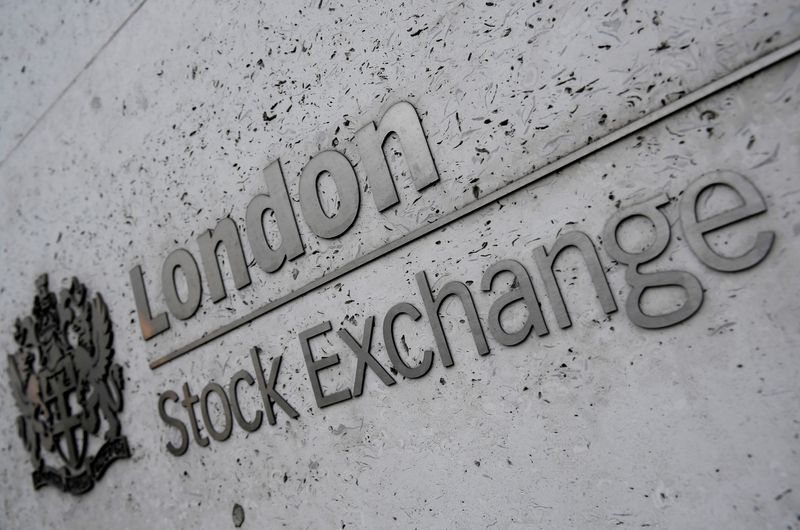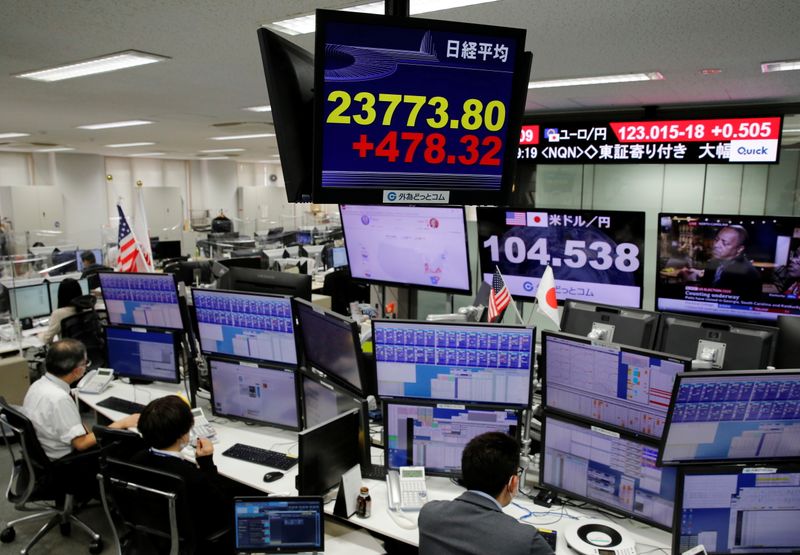By Sujata Rao and Tom Arnold
LONDON (Reuters) - Global shares flat-lined on Friday as rising U.S. and European COVID-19 hospitalisations tempered the euphoria over a promising vaccine, though Wall Street looked set for a firmer open on news President-elect Joe Biden was set to cement his election win.
U.S. futures rose 0.7% by 1200 GMT after Edison Research projected Biden to capture the battleground state of Arizona, further weakening President Donald Trump's efforts to overturn the results of the Nov. 3 election.
However, the pan-European stock index was down 0.1%. MSCI's all-country equity index slipped 0.1%
"You had the news overnight in the U.S. on COVID, which is not that good and that ... provides an opportunity for investors to book some profit post-Pfizer and post-U.S. elections," said Francois Savary, chief investment officer at Swiss wealth manager Prime Partners.
Thursday saw Wall Street end lower on news of rising coronavirus infections and as investors weighed up the schedule for rolling out effective vaccine. Several U.S. states have introduced stricter social distancing rules following reports of record hospitalisations
In Europe, too, the number of hospitalisations are now higher than at the peak of the first wave and officials said measures to control infections must continue.
In a sign of the air of caution surrounding the continent, Spanish central bank governor Pablo Hernandez de Cos and European Central Bank board member Isabel Schnabel said although the prospect of an effective vaccine was a relief, the euro zone was still set to suffer from new curbs on economic activity to combat a rise in infections.
U.S. Federal Reserve Chair Jerome Powell said on Thursday that progress in developing a coronavirus vaccine was welcome news but near-term economic risks remain, underscoring the likely need for additional government stimulus.
World stocks are up 1.4% for the week, however. They reached record highs on Monday when pharma giant Pfizer Inc (NYSE:PFE) announced its vaccine had been effective in 90% of cases during trials. Russia followed up by reporting its vaccine trial, too, had shown promise.
European markets lost 0.1% to 0.7% on Friday, but the STOXX pan-regional index is set for a second week of big gains. It's up 5% so far this week as the vaccine news induces more investors to buy shares in banks and travel firms.
Earlier, Chinese blue-chips lost 1% after the Trump administration said it would ban U.S. investments in firms linked to the Chinese military. A series of high-profile bond defaults by state-owned enterprises also weighed.
Japan's Nikkei 225 fell 0.57%.
Some investors saw the pullback as a buying opportunity.
"My view is this is the dark just before dawn," said Michael Frazis, portfolio manager at Frazis Capital Partners in Sydney.
"You've got the second wave of coronavirus, new sets of shutdowns, clear problems around the world, travel dropping off again ... But at the same time, we have the strongest possible evidence that we do have a vaccine."
STIMULUS
One sticking point for markets has been the inability of U.S. lawmakers to agree an adequate spending package. The need for this stimulus was highlighted by Thursday data showing a slower pace of jobs recovery and weak inflation.
While Democrats in Congress urged negotiations over a multi-trillion-dollar stimulus plan, top Republicans rejected that as too expensive.
U.S. Treasury yields slid further, with 10-year yields slightly lower at 0.88%, well off the seven-and-a-half month high of 0.98% hit on Monday.
The yield curve, a gauge of growth and inflation expectations, has flattened, too.
"That got a further nudge from the softer-than-expected U.S. inflation data for October which were released yesterday, and which tally with a weaker economic reality," ING Bank analysts said, referring to the snapback in bond yields.
The cautious tone taken by European policymakers supported the perception that progress on the vaccine will not stop central banks from delivering more stimulus.
Germany's 10-year yield slipped 1.5 bps at -0.54%, moving off this week's two-month highs.

Oil prices remained on track for a second week of gains, but the COVID-19 surge and higher U.S. crude stockpiles pushed Brent futures 0.9% lower to $43.17 a barrel.
